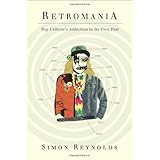
Average Reviews:

(More customer reviews)Are you looking to buy Retromania: Pop Culture's Addiction to Its Own Past? Here is the right place to find the great deals. we can offer discounts of up to 90% on Retromania: Pop Culture's Addiction to Its Own Past. Check out the link below:
>> Click Here to See Compare Prices and Get the Best Offers
Retromania: Pop Culture's Addiction to Its Own Past ReviewSimon Reynolds is one of the best, if not the best, pop music historians alive. An outstanding writer with a superhuman work ethic and encyclopedic knowledge of seemingly the entirety of pop history, he's written the definitive histories of two important musical movements-- electronica, in Generation Ecstasy, and post-punk, in Rip It Up and Start Again-- both of which I enjoyed. The man is indisputably brilliant.That said, I feel that Reynolds was the wrong man for the present job, namely: making sense of the retro-fueled 2000's.
The crux of the problem is that Reynolds doesn't like or doesn't seem to "get" most of the decade's music and technology, including the iPod, MP3s, Mashup, and the Internet in general:
* On the Internet: "the result, visible above all on the Internet, is that the archive degenerates into the anarchive: a barely navigable disorder of data-debris and memory-trash."
* On the iPod: "I was very resistant, partly because I was never that keen on the Walkman (I don't like to be insulated from the sounds of the city as I pass through it; equally, I dislike the way the outside noise interferes with the music)... [The iPod is] an emblem of the poverty of abundance."
* On MP3s: "music to MP3 is a bit like the concentration process, and it's done for much the same reason: it's much cheaper to transport concentrate because without the water it takes up a lot less volume and it weighs a lot less. Yet we can all taste the difference."
The Internet is "barely navigable"? Not since Google. The iPod is a "poverty of abundance"? That's surely not as bad as lugging a Discman around again. Sure, MP3s sounded like crap in the days of 128 kbps rips from Napster, but those days are long gone. Bottom line: Is a man who dislikes the iPod really the best person to chronicle the past decade of music?
Those bigger issues aside, the book is too easy to put down. Only two Amazon reviews two months after publication? I strongly suspect that readers are having a hard time getting through it, as I did. Not that everything should be easy to understand, but at 500 pages the book is far too long for the tenuous and uncertain conclusions Reynolds reaches, most of which he spells out in the introduction. He skips from genre to genre and band to band with only loose and unsatisfactory theories to bind the narrative. They are:
- No music from the 2000's was remotely as good as the best albums from previous decades.
- Retro has killed true innovation.
- The technological marvels of the decade have not made our music significantly better. Just flashier.
And Reynolds is by no means wrong. He's largely right. But did he really need 500 pages to say it all?
Outsiders are often the cultural critics who have the ability to see and summarize the big picture (e.g. Tom Wolfe, Hunter S. Thompson, de Tocqueville), but here I think an insider is rather what we need, someone to blaze a cohesive and clear path through the tangle of the 2000s.
Maybe such a path doesn't exist, but surely Reynolds missed a major opportunity by his summary dismissal of Mashup. Which is surprising, because the real story of Mashup-- a bunch of mostly British weirdos laboring in obscurity whose work suddenly blew up and was immediately absorbed by the mainstream-- sounds exactly like all the stories Reynolds normally seems to like, namely those of punk, electronica, and 60's rock. Reynolds dismisses Mashup as a "fad," "a barren genre-- nothing will come from it." Yet half the decade's pop music grew from the seeds Mashup planted, from Madonna's "Hung Up" through Lady Gaga, the Black Eyed Peas, much of Kanye, Katy Perry and the current genre gumbo we find ourselves in.
All those criticisms aside, there is much to praise in Retromania. In can be exhausting, but if you're willing to roll with Reynolds' poetic meanderings, he can be a pretty fascinating idea factory. I did enjoy his descriptions of certain bands and genres, including his summary of Shibuya-kei (which may be the best one in print, even if I disagree with some of his conclusions). In sum, even though I find this book hard to love, I admire it, and Reynolds does lay out a wide variety of theoretical tools and approaches that we and hopefully future critics can build upon in the (perhaps hopeless) quest to make some kind of sense of the decade in pop.Retromania: Pop Culture's Addiction to Its Own Past Overview
Want to learn more information about Retromania: Pop Culture's Addiction to Its Own Past?
>> Click Here to See All Customer Reviews & Ratings Now
0 comments:
Post a Comment